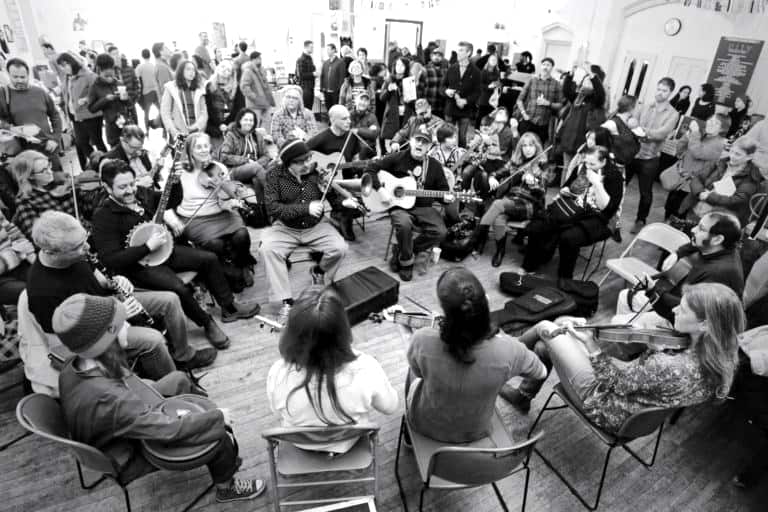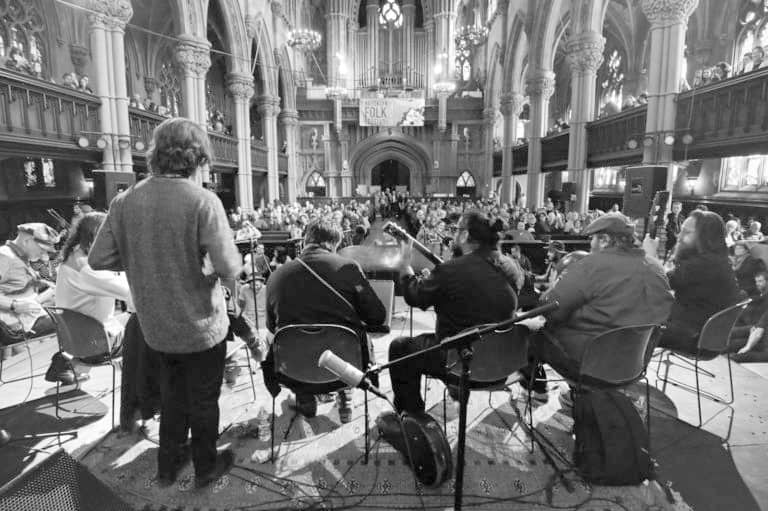Now in its 11th year, the Brooklyn Folk Festival brings three days of music, workshops, film screenings, contests, and jam sessions to the beautiful, historic St. Ann’s Church located at 157 Montague St. in Brooklyn Heights April 5-7th.
Presented by the Jalopy Theatre and School of Music, the Festival is produced by Eli Smith, a banjo picker and passionate aficionado of roots music.
Smith teamed up with Geoff and Lynette Wiley, owners of the Jalopy, to produce the first festival in 2009. And it’s not just American folk music. Smith says, “There will music rarely heard from Sardinia, Mali, and the Caribbean Coast of Columbia.”
Providing more detail, Smith states, “We’re having a Louisiana dance party Friday night with three bands: Jackson & The Janks, The Big Dixie Swingers, & The Revelers who all play Cajun, Zydeco, & Swamp. It’s great fun for dancing, and they rarely play in NYC. Saturday, Dan Zanes and Claudia Eliaza will be performing family friendly music at noon. There will also be a workshop called ‘Playing With Trash,’ where participants can build instruments out of everyday found objects. There will be another workshop revealing the banjo’s earliest history and its African roots, and of course the famous banjo toss, where contestants toss a banjo into the Gowanus Canal with a chance to win a new banjo.”

“We have 2 amazing bands coming from GA, Jontavious Willis, who plays blues – Friday night – and Kashiah Hunter, who plays sacred steel guitar, playing at 9:30pm Sat April 6,” Smith adds.
Attendees will also be able to view the premiere of “American Epic” – a documentary about American Folk Music produced by Robert Redford and Jack White.
For the hungry, a folklorist has curated a delicious selection of food from the diverse traditions in NY, including traditional Ethiopian food. Comestibles can be purchased in a food court-vending area all within St. Anne’s Church.
When asked how he finds performers, Smith says, “The festival is curated by me; it reflects my vision of folk music. I’m always researching and finding new folk music. It’s my passion and what I do. The bands represent a community of musicians. It’s a grass roots, underground community of musicians from New York and across the country who are generally underrepresented on festival stages. You won’t often hear or see these great bands elsewhere. Our festival is a great place to discover new music”
According to Smith, while modelled on classic festivals like the New York Folk Fest or the old University of Chicago Folk Festival, today The Brooklyn Folk Festival is one of the few of its kind. “There’s such a wealth of talent here in New York that it’s overwhelming, which is why I began this, to present these musicians. The challenge is to break through the wall of the ‘Music Industrial Complex.’ We don’t base our fest on hype and marketing strategies. We’re here to hip people to something they might not have heard about before.”
About the enduring legacy of folk music, Smith responds, “Folk music has come through the generations with us. It’s very humanistic music that has served us emotionally for centuries. It’s music that is timeless.”
For more information and to purchase tickets, go to brooklynfolkfest.com.









